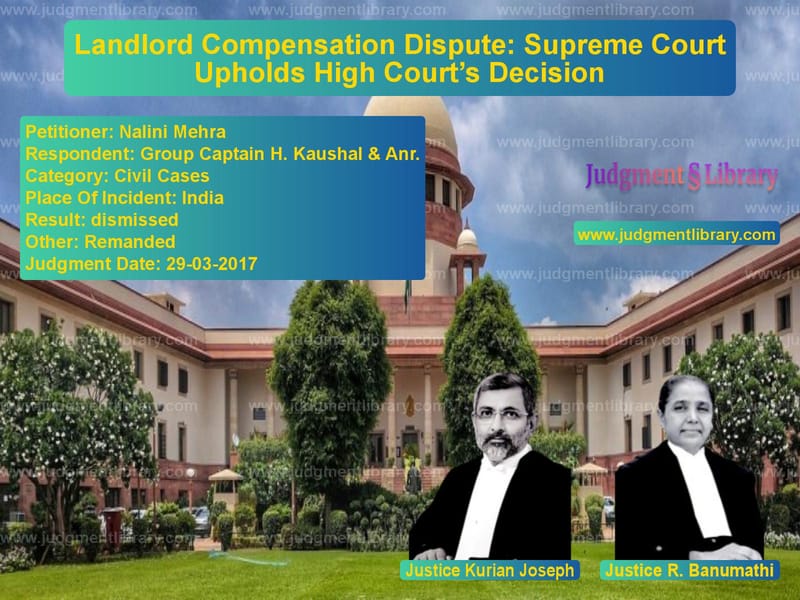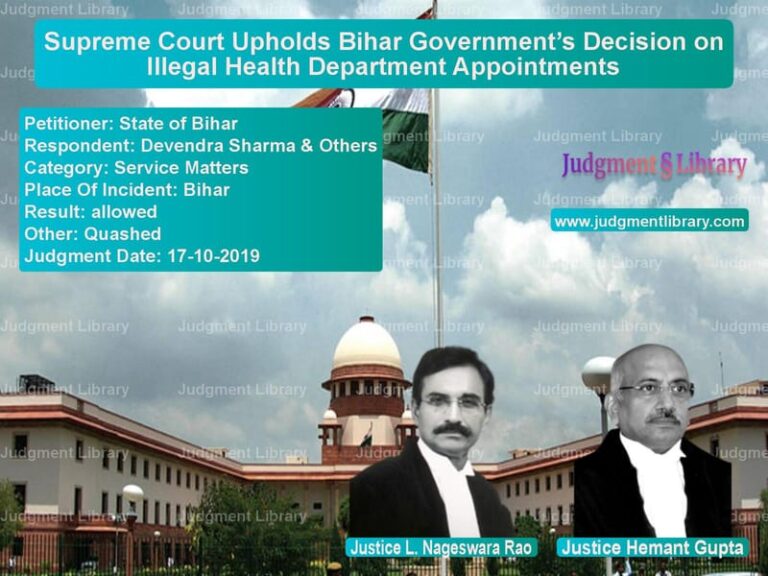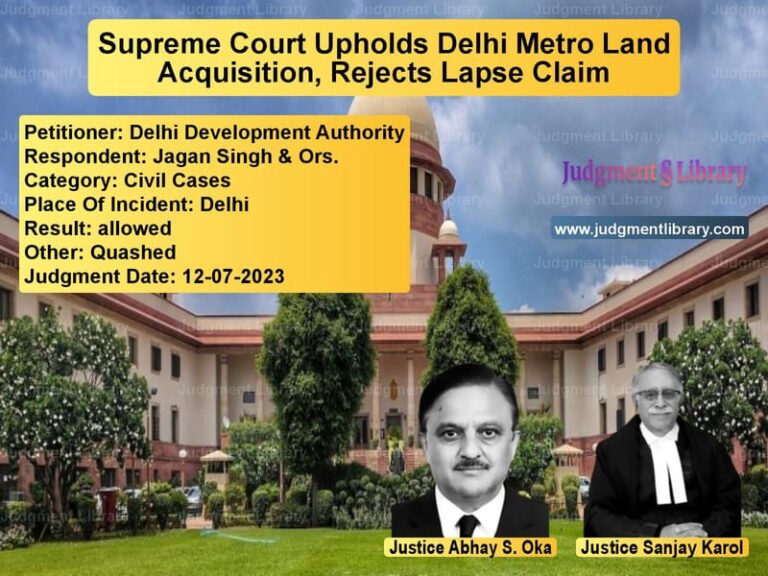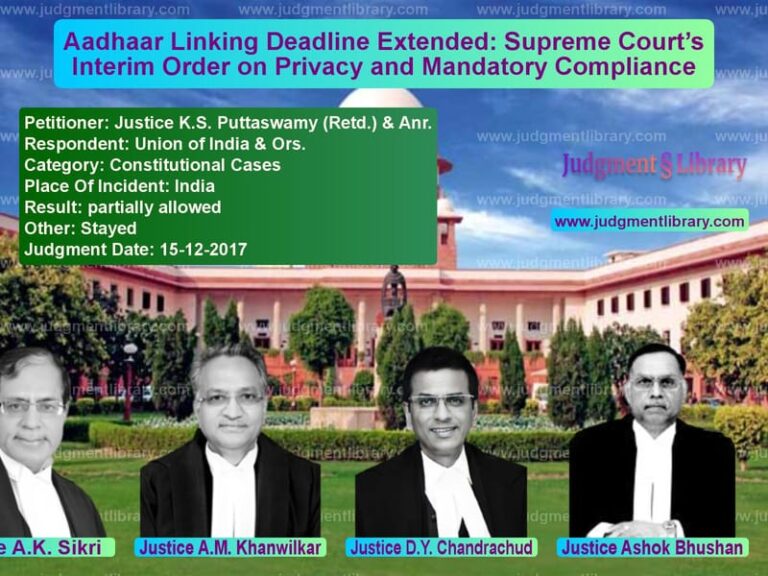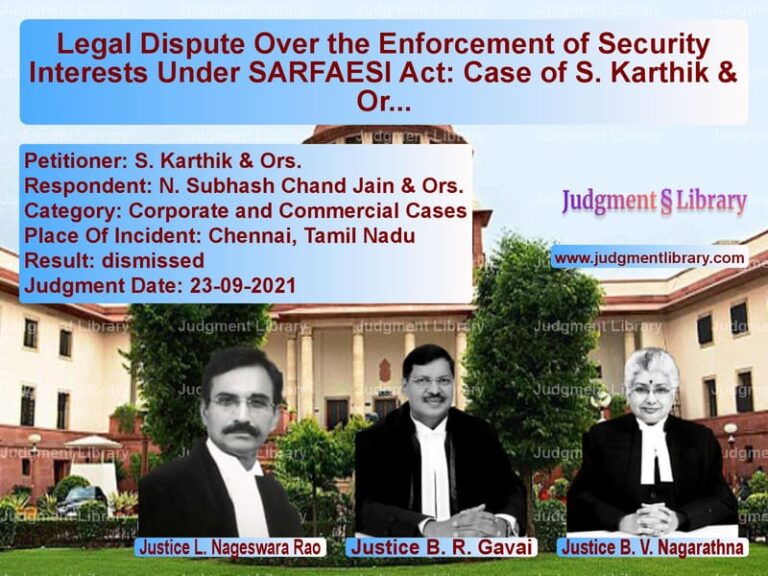Landlord Compensation Dispute: Supreme Court Upholds High Court’s Decision
Landlord-tenant disputes have long been a matter of judicial scrutiny, especially when compensation and financial settlements are involved. One such significant case is Nalini Mehra v. Group Captain H. Kaushal & Anr., in which the Supreme Court was called upon to determine whether the High Court’s decision to remit a compensation matter to the Competent Authority was justified.
The Supreme Court upheld the High Court’s ruling, dismissing the appeal filed by the appellant, Nalini Mehra, and allowing the matter to be determined by the Competent Authority. While the appellant was permitted to present all legal contentions except those relating to jurisdiction, the Court emphasized the importance of procedural fairness in determining financial matters between landlords and tenants.
Background of the Case
The dispute arose when the respondent, Group Captain H. Kaushal, approached the courts seeking compensation for the use and occupation of his property. The appellant had been in possession of the premises, and the issue at hand was the quantum of compensation that should be awarded. The High Court ruled that the matter should be remitted to the Competent Authority for an appropriate determination of compensation.
The appellant, dissatisfied with this decision, filed an appeal before the Supreme Court, arguing that the remand was unnecessary and that the compensation amount should be decided outright rather than being subjected to further procedural delays.
Petitioner’s Arguments
The appellant, represented by her legal counsel, presented the following arguments:
- The remand order was unjustified, as the matter had already been extensively litigated and no further determination was required.
- Remanding the matter would result in unnecessary delays and increased litigation costs.
- The compensation amount could and should be determined by the court instead of referring it back to the Competent Authority.
Respondent’s Counterarguments
The respondent, represented by Group Captain H. Kaushal, countered the arguments by stating:
- The High Court had acted within its jurisdiction by remitting the case, ensuring that the appropriate authority determined the financial compensation.
- The Competent Authority was best suited to decide the quantum of compensation, as it had the necessary expertise and procedural framework to make such determinations.
- The appellant’s objections were aimed at avoiding a fair and just assessment of compensation.
Supreme Court’s Judgment
After reviewing the case and considering both parties’ arguments, the Supreme Court, comprising Justices Kurian Joseph and R. Banumathi, ruled as follows:
- The High Court’s decision to remit the case to the Competent Authority was appropriate and justified.
- The appellant was permitted to raise all available contentions before the Competent Authority, except those relating to jurisdiction.
- The Supreme Court found no substantial question of law that would warrant intervention.
- Since no legal infirmity was found in the High Court’s order, the appeal was dismissed.
- All pending applications, if any, were also disposed of.
- No costs were awarded to either party.
Key Legal Takeaways
The Supreme Court’s ruling reinforces several legal principles in landlord-tenant disputes:
- Role of Competent Authority: Matters related to compensation should be determined by the designated authority rather than through prolonged litigation.
- Judicial Deference to Specialized Authorities: Courts should avoid intervening in matters where specialized authorities have the jurisdiction to make determinations.
- Limited Scope for Appeal: The Supreme Court reaffirmed that lower court remand orders should not be interfered with unless there are clear legal errors.
- Right to Raise Contentions: While jurisdictional matters were settled, the appellant retained the right to present other legal arguments.
Implications for Future Cases
This judgment sets an important precedent in similar disputes:
- Encourages reliance on competent authorities for financial determinations.
- Clarifies that remand orders should be respected unless serious legal errors exist.
- Ensures that parties retain the right to argue their case before the appropriate forum.
- Affirms that judicial intervention should be minimal in cases involving administrative or regulatory authorities.
Conclusion
The Supreme Court’s decision in Nalini Mehra v. Group Captain H. Kaushal & Anr. underscores the importance of procedural fairness in compensation disputes. By upholding the High Court’s decision to remit the case, the Court reaffirmed that financial matters should be resolved by the designated authorities rather than through prolonged judicial intervention.
The ruling is significant in the realm of landlord-tenant litigation, reinforcing the principle that courts should defer to specialized bodies when it comes to determining compensation and other financial matters. For landlords and tenants alike, this judgment serves as a guiding precedent on how compensation claims should be handled in legal disputes.
Don’t miss out on the full details! Download the complete judgment in PDF format below and gain valuable insights instantly!
Download Judgment: Nalini Mehra vs Group Captain H. Kau Supreme Court of India Judgment Dated 29-03-2017.pdf
Direct Downlaod Judgment: Direct downlaod this Judgment
See all petitions in Property Disputes
See all petitions in Specific Performance
See all petitions in Damages and Compensation
See all petitions in Judgment by Kurian Joseph
See all petitions in Judgment by R. Banumathi
See all petitions in dismissed
See all petitions in Remanded
See all petitions in supreme court of India judgments March 2017
See all petitions in 2017 judgments
See all posts in Civil Cases Category
See all allowed petitions in Civil Cases Category
See all Dismissed petitions in Civil Cases Category
See all partially allowed petitions in Civil Cases Category

